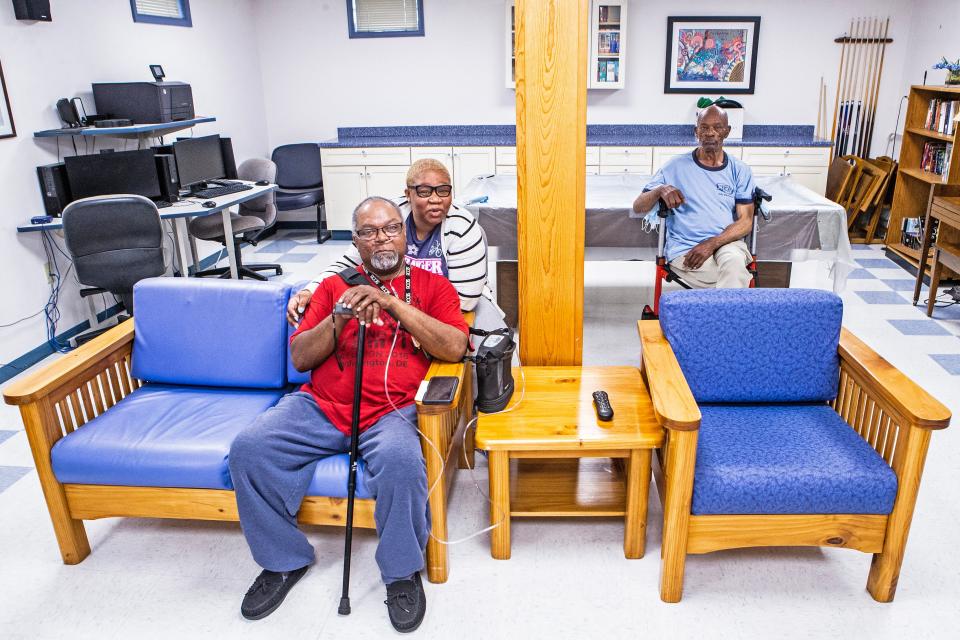Delaware to see $1.8 million cut in HIV prevention, intervention services across the state
Tyler Berl thought about the challenge in today’s fight against HIV.
With the 35th World AIDS Day coming Dec. 1, one day is dedicated to raising awareness of the crisis caused by HIV spread, while also mourning those lost to one of the most destructive epidemics in human history. More than 35 million people have died over four decades.
Almost 3,800 Delawareans live with the disease, as of data released last year, while new infections still average nearly 100 per year. HIV can be managed with treatment today and rarely delivers an AIDS death sentence, though there's not yet a cure or effective vaccine.
“Apathy,” Berl said, looking up at his computer.
In November, Delaware’s Division of Public Health confirmed it will have to cut roughly $1.8 million in HIV prevention programs in the First State starting next year, due to reductions in federal funding. The state is expecting roughly a $802,000 cut from funding related to its Ryan White HIV/AIDS Program, alongside $1 million previously from the Centers for Disease Control and Prevention’s Disease Intervention Specialist initiative, kick-started by pandemic spending.
These funds have supported early intervention services, HIV counseling, testing, PrEP referral services, condom distribution services, advertising outreach across the state and more. About eight providers lead these services in Delaware. Four contracts have been eliminated completely, according to DPH, and any remaining community-based organizations will see funding reductions.
“We don’t fully understand what the level of impact might be at this point in time,” as one DPH spokesperson put it Nov. 17.
Cuts to disease intervention personnel in particular go further than HIV alone.
The state disease investigation force — bolstered in 2020 to respond to other STI infections, food-borne illnesses and any other reportable diseases — will be left with just three investigators for the entire state. About 20 paraprofessionals will likely be let go. And the expansion is slated to see another $1 million cut in 2025.
The Ryan White cuts, dollars reduced from a pharmaceutical rebate program, are assumed to be permanent. Though DPH seemed confident such reductions can be weathered as services shuffle and solutions are explored — the sudden 44.5% cut in expected funding will reverberate through HIV advocates.
Berl, Delaware HIV Consortium’s executive director, expects to have to lay off its two HIV prevention specialists, as well as transition its director of HIV Prevention & Outreach Services into other areas of the organization, as contract funds awarded would pay less than half of her salary.
"Following these cuts, we will no longer have a single person dedicated solely to HIV prevention activities in the community," Berl said, strapping testing services to mainly walk-ins. This will also eliminate the consortium’s condom distribution program and education outreach programs, among other impacts he waits to fully understand.
"All of us are determining the amount of layoffs we will have to make to ensure long-term financial stability during this next year."

Brandywine Counseling and Community Services said it will likely have to cut HIV counseling and testing in Kent and Sussex counties, fold its condom distribution service and HIV outreach, while also laying off at least two positions.
“I didn't see this one coming,” said Lynn Morrison, CEO and president of Brandywine Counseling. She said HIV advocates have been getting used to doing more with less, but “I feel like $1.8 million is a lot in a budget where we've been able to make those dollars go so far.”
Beautiful Gate Outreach Center has been shepherding this work in Delaware communities for well over two decades, particularly advocating for communities of color. The outfit expects to lose roughly a third of its budget in HIV prevention. CAMP Rehoboth, a community service organization dedicated to supporting LGBTQ populations in and around Rehoboth Beach, also offers HIV prevention services in Sussex. Like many organizations, it couldn’t yet specify which programs will face cuts.
"No matter the cuts, CAMP Rehoboth is still committed to providing the services we can with the resources we have and partnering with other organizations to provide the best services possible," said Kim Leisey, executive director at CAMP Rehoboth.
Delaware’s Division of Public Health hopes to minimize the impact by bringing some programs in-house, from condom distribution to HIV cluster investigations, while seeking other funding avenues. But with an already limited staff and resources, challenges persist.

Unrelated HIV/AIDS supportive housing avoided a different threat, just this August. After the Delaware Continuum of Care cut nearly $700,000 from three of the Ministry of Caring's housing programs, a one-time infusion of $500,000 from the state’s American Rescue Plan Act funds helped keep dozens of residents from being forced out of House of Joseph II and Mother Mary of Hope House. Plans for future funding remain unclear.
“We're at a crossroads,” Berl continued.
DPH leaders say HIV prevention funding will more closely resemble levels five years ago. Advocates fear HIV testing and education efforts will decline, while trust built in communities could do the same.
“We're at a point in the HIV epidemic where the community is working against a bit of apathy toward HIV — with COVID, with monkeypox, with other public health flavors of the month — we forget the work," Berl said. "That HIV is still here, that it's an epidemic, that it’s impacting Delaware.”
Help is there: After 4 fatal overdoses in 2 weeks, county police focus on helping those with addiction
HIV prevention braces for impact
Renee Beaman has been in this work for more than 40 years.
The founder of Beautiful Gate is glad today’s generations are largely strangers to the pain HIV brought to their state, particularly tearing through Black and brown communities. By 2004, Delaware had held one of the nation's 10-highest rates of AIDS cases for more than a decade, as previously reported by Delaware Online/The News Journal, while Wilmington's Eastside bore the brunt.
When Beaman was continuing the groundwork of her HIV/AIDS service organization out of Bethel AME Church, back in 2001, 82% of cases were among Black residents.
She applauded the long work to fight those figures. But it was never finished.
“Delaware should be proud of what we have done — and now should be just as nervous that this level of protection is now being stripped away with the loss of funding,” said the now-director of Delaware’s Division of State Service Centers, known for her HIV ministry work.
Beautiful Gate coordinates some 20 hours of testing weekly, fueled by ongoing community outreach and a partnership to offer treatment services with ChristianiaCare. It also offers some of the few support groups for those living with HIV in the state.
Now, staff will have to be cut. Hours will scale back. Testing and community canvassing will take a hit, though the Wilmington-based organization is still waiting to understand the full impact.
“I worry that it’s going to shatter our relationship with the community, that we're not going to be there when they need us,” Beaman said. “And we’ve always been there.”
Like many advocates, Beautiful Gate worries this will stunt any growth to come. And solutions feel in short supply.
Shopping: 5 reasons why the Christiana Mall is bucking doomsday predictions for retail
The health department is managing certain programs, while investigating what else it could take on in-house. Some community organizations, like the Delaware HIV Consortium, have agreed to keep testing clients for HIV without a contract if the state supplies tests. DPH is also working to develop a mail-order condom distribution program and website.
DPH has looked to cover these losses, particularly those to disease intervention specialists. Appeals for state budget funding are “pending review and response,” while the department continues to explore possible grants. HIV organizations say fundraising has already been challenging out of the pandemic.
Beaman remembers what first got people to pay attention.
“It really was the voice of the community and those impacted,” she said, thinking back to the early fight against HIV.
“That might be another only option that we have — our agencies come together, our clients come together, that we have to make some noise about what we know will be the impact.”
‘I got goosebumps’
The state health department says its foremost concern is bigger than HIV alone.
This July — amid the second year of a five-year Disease Intervention Specialist Workforce grant from the CDC — congressional action during the debt ceiling crisis abruptly cut the last two years of funding. That reflects the first $1 million reduction for Delaware.
This team of specialists investigated some 2,350 Delaware cases last year alone, according to DPH, out of 6,000 lab reports received. Today, STI Infection rates are projected to increase by roughly 1,200 diagnosed cases annually, according to the department.
"I can assure you one thing, if a disease like HIV hit any one of their family members, I'm absolutely sure they wouldn't have pulled this funding. I'm absolutely sure they would have thought twice," said Attillio Zarrella, public health treatment program administrator, of Congress.
"Everybody I think was shocked, up and down the flagpole. They were just shocked, all the way up to HHS. I don't think anybody saw this coming."
Delaware’s team will reduce to three investigators, handling interviews, resource coordination, partner identification, notification and more across various reportable diseases. DPH says its best specialist investigates roughly 160 cases per year. Delaware hardly had a team like this before 2020.
There's worry about the position it puts the state in if another coronavirus chapter emerges.
“I got goosebumps, like oh my goodness,” Beaman said. “When you remove all of that, there's nothing good that will come from it.”
In the context of HIV, advocates say both of these cuts threaten how Delaware has controlled its spread.
Organizations will continue to urge testing. Cuts will impact PrEP referrals offered, the drug having increased access to protection from new infection. Without the intervention team — interviewing those testing positive, following up to ensure continued treatment — duties may fall to others within HIV programs. DPH conceded HIV rates could increase due to lack of treatment compliance.
Opinion: Hall-Long's campaign audit reveals a stark reality: Delaware deserves greater transparency
Thinking again of World AIDS Day, Beaman could look back to the first. It came in 1988.
She would watch it evolve from chiefly a day of mourning, to one also celebrating meaningful medical achievement. This year, it will come with a familiar influx of mixed emotions.
“For 42 years, HIV has been a deadly disease. And we have not given it the funding, the identification, the notification for our communities as we should,” she said.
“And now with cuts, I'm so saddened to see what's going to happen. Not today, not the first quarter of 2024 — but how it's going to impact Delaware, our communities, especially the communities of color going forward, when they don't have the same access.”
Got a story? Kelly Powers covers race, culture and equity for Delaware Online and USA TODAY Network Northeast, with a focus on education. Contact her at kepowers@gannett.com or (231) 622-2191, and follow her on Twitter @kpowers01.
This article originally appeared on Delaware News Journal: Delaware to see $1.8 million cut in HIV prevention across the state

